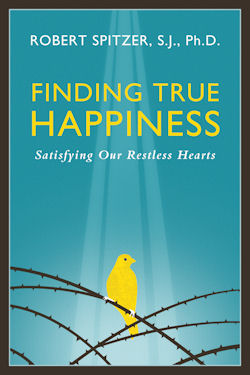
|
Posted July 12, 2015
Book: Finding True Happiness: Satisfying Our Restless Hearts Author: Robert Spitzer, S.J. Ignatius Press. San Francisco. 2015. Pp 312 An Excerpt from the Jacket:
One of the hottest topics in contemporary culture is happiness. The explanation for this current fixation seems to lie in the contrary phenomenon --- unhappiness. Despite the fact that we have tremendous access to every imaginable form of entertainment, we experience a pervading sense of insecurity, emptiness, and malaise amid sporadic peak experiences. Finding True Happiness attempts to provide a way out of this personal and cultural vacuum by helping people to identify and then reach for happiness. As Aristotle noted 2,400 years ago, happiness is the one thing we can choose for its own sake ---everything else is chosen for the sake of happiness. After exhaustive investigation of philosophical, psychological, and theological systems of happiness, Fr. Spitzer developed the Four Levels of Happiness, which he based on the classical thinkers Plato, Aristotle, Augustine, and Aquinas; the contemporary philosophers Marcel Scheler, Buber, Ricoeur, and Jaspers; and the modern psychologists Maslow, Frankl, Erikson, Seligman, Kohlberg, and Gilligan. Finding True Happiness is both a philosophical itinerary and a practical guidebook for life's most important journey --- from the mundane and meaningless to transcendent fulfillment. An Excerpt from the Book: We may now turn to cosmic loneliness. Religious existentialists also believe that the individual person is interpersonal. When we are not in relation to others, we feel like a mere fraction of ourselves. The more we are in relation to others, the more we experience ourselves, and the deeper our relationship with others, the deeper our experience ourselves. Other people make us come alive, reflect us back to ourselves, and give us significance in our relationship with them. The more we invest ourselves in others, the more others invest themselves in us. This brings with it love, meaning, and well-being. When we are deprived of the presence of others, we lose this sense of significance, love, and well-being --- along with it, most of our sense of self. It is almost like someone has torn away a part of our being. The Jewish existentialist philosopher Martin Buber noticed that our interpersonal personhood has, as it were, two layers: the "this worldly" layer (which he terms "I-thou") and a transcendent and absolute layer (which he terms "I-Thou"). For Buber, our being not only anticipates and desires other human beings, but also an ultimate and absolute interpersonal Being. Our being is conditioned by the need for both a concrete person and an absolute person. Buber's insight is not as difficult as it might seem. Have you ever had an acute feeling of loneliness in the midst of a family get-together or at a wedding reception in which you felt the presence of your family and friends in a joyful and positive way? If so, you might have thought, "This doesn't make any sense. I'm loved by family and friends, life is going well, there is a pervasive sense of joy, and yet I feel that something or somebody is missing --- somebody really important." You are aware that you are feeling lonely, but you don't know for whom. You try to enter more fully into conversations, connect with certain family members and friends, but to no avail; the feeling of "missing someone important" persists. The Catholic philosopher and theologian Karl Rahner provides some insight into this particular experience. He contends that God creates us in relationship to Himself from the first moment of our existence. If we enter into this relationship with Him, we will feel normal (though sometimes "supernormal"); however, if we ignore our relationship to the Creator, we will feel what was termed "cosmic loneliness." This relationship with the Creator is so intimate and fundamental that it is like a relationship with our parents. Table of Contents: 1. Choosing happiness 2. Are we really transcendent? 3. The comparison game 4. Escaping your personal hell 5. Call of the Transcendent 6. A dynamic encounter with God 7. Contemplation in action 8. Divine inspiration and guidance 9. Interior transformation 10. Transcendent happiness |
|
